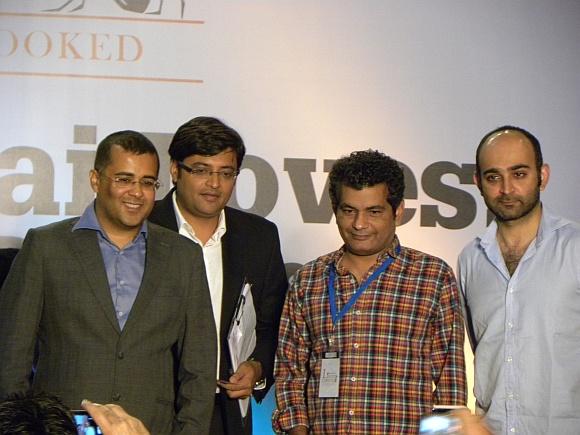
The line-up of authors at the Times of India Literary Carnival said something about the city that hosted it. Abhishek Mande reports.
The first thing that struck you about the Times of India Literary Carnival held in Mumbai's Mehboob Studios was the fact that it lacked some of the luminaries in the world of literature.
To add to it, 'non-literary' folks such as fitness expert Rujuta Diwekar, filmmakers Zoya Akhtar and Ayan Mukherjee and business executives such as Deepak Parekh really made you wonder how 'literary' this literary carnival really was.
Then there was Chetan Bhagat, who many felt was a total misfit in the session featuring two of Pakistan's biggest writers today -- Mohammed Hanif and Mohsin Hamid.
Yet in some ways, this very line-up of speakers said something about what we as a city read... or rather don't read.
As a city, we're obsessed with (and constantly fighting) weight issues; we probably like to talk about investments more than anyone else in the country and even though some of us may not like it, an incredibly high number of us do read Chetan Bhagat.
The literary carnival that lasted three days did however see a few interesting sessions.
On day one the largest hall in the venue was jam-packed to watch Mohsin Hamid, Mohammed Hanif and Chetan Bhagat lock horns over whether Pakistani writers are writing more poignant literature than their Indian counterparts.
The firebrand television host Arnab Goswami moderated the session, which was perhaps the one of the few sessions that day to be fully packed.
Goswami known to be quite a terror on his new show, was surprisingly chilled out, a point that Chetan Bhagat didn't forget to mention.
Despite Bhagat, or perhaps because of him, the session turned out to be quite lively as the three authors locked horns on various issues.
Read more about it here
...
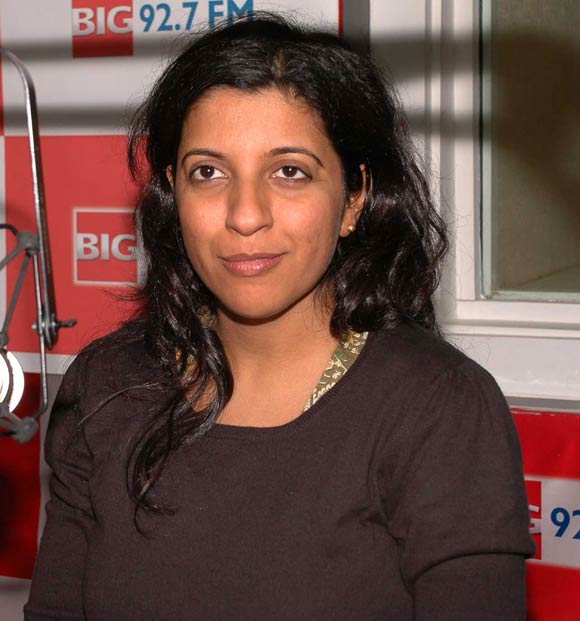
In another interesting session in the evening of Day One, three filmmakers -- Zoya Akhtar, Ayan Mukherjee and Imtiaz Ali got together for to discuss the 'New Language of the Movies'
It was moderated by Jitesh Pillai, editor of Filmfare and was about Bollywood's changing notion of aesthetics and the new crop of directors that's giving it a new form with their new-age ideas, notions and the way they function.
The directors talked at length about how their vision manifests in the final product after countless edits and shoots -- Zoya Akhtar pointed out how she had to squeeze in a workout scene with Hrithik to justify his buff body in Zindagi Na Milegi Dobara (he plays a banker in the film) and cut down some of Katrina's 'preachy' scenes as she played a carefree woman.
Most other interesting moments involved the audience. When a disgruntled Imtiaz Ali fan complained that Nargis Fakhri was 'awful' in Rockstar, the crowd made approving noises while Ali said that he'd still stand by his decision of casting her.
The highlight of the evening, however, was when one of the audience members questioned the extensive and frequent use of profanity in today's films -- "It corrupts young people because they emulate in real life what they see on the big screen" - was his grouse.
Zoya asked, "If that's the case then why everybody didn't turn righteous after watching all the noble heroes we've had onscreen for so many decades?"
Needless to say, that was followed by a thunderous applause.
...
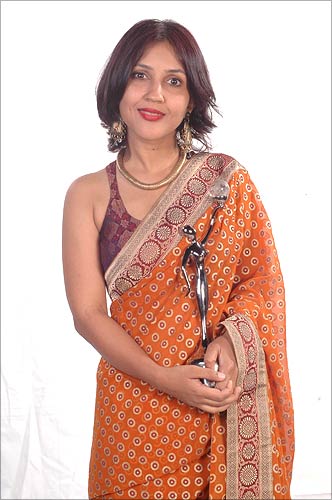
In another 'non-literary' session Sourav Ganguly, Shehan Karunatilaka, Deep Dasgupta and Anuja Chauhan discussed whether cricket is slowly but surely losing its charm.
Anuja Chauhan suggested that one of the reasons for falling TRPs and cricket exhaustion is because of the many formats -- Test, One-day and T20 -- that co-exist.
Deep Dasgupta added that it could also be because 'we play a lot of inconsequential matches'.
As the topic of discussion moved towards the decades-old one-day vs test match debate, Sourav Ganguly pointed out that Sachin Tendulkar, the greatest cricketer playing today has chosen to opt out of a lot of One Day matches but never once sacrificing a Test match.
Dressed in a blazer, Ganguly fielded questions that ranged from cricket to politics. And while he did say that there was 'a little bit of cricket left' in him and that Mamata Banerjee was doing a great job of resurrecting his home state of West Bengal, he didn't entirely reject the idea of turning a politician.
...
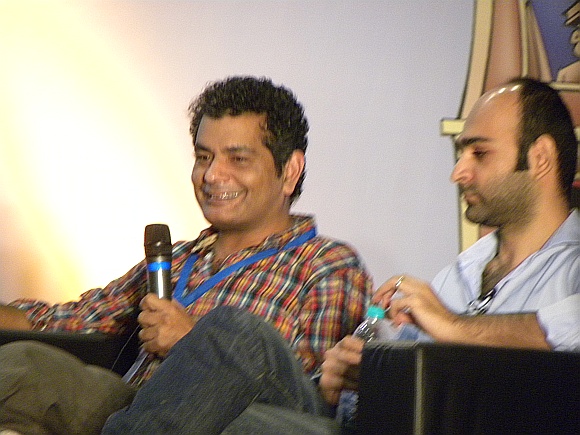
If ever they decide to give out an award to the best speaker in the carnival, Mohammed Hanif would probably win it hands down.
The author of A case of Exploding Mangoes and the newly released Our Lady of Alice Bhatti isn't just a great writer but also a fantastic speaker.
While Ganguly held court in the largest studio floor of the complex, Mohammed Hanif was relegated to a much smaller studio which, thanks to his reputation was overflowing with as many people watching the session on live TV on the outside
Hanif, who speaks with a slight drawl and has the ability to hold an audience for hours, which was a good thing considering the 90-minute sessions could sometimes tend to get a little... well... boring.
Thanks to Hanif's reputation, the hall was overflowing with his fans and those of his interviewer -- filmmaker Anurag Kashyap.
The two men talked about writing in Pakistan, writing in general, boob metaphors and filmmaking among many other things. Kashyap who's read both of Hanif's books pointed out that there is a lot of anger in his books even though as a person he's rather chilled out.
Hanif laughed and confessed that he did notice it himself and has often wondered where all the anger is coming from.
He then went on to regale the audience telling about his attempts to consciously write less violent and angry rants. "Later, when I went back to the notes and read them. I discovered they were innovative ways to murder a person! I tore them away immediately," he said with a chuckle leaving the audience in splits.
In another anecdote, he talked about being approached by a filmmaker who offered to make A Case of Exploding Mangoes into a movie.
When he read the book though, Hanif said, he was rather disappointed and shelved the idea entirely because 'most of the book is set in dungeons and dark areas' which would be 'a nightmare to light up'.
Hanif who is a former pilot with the Pakistan Air Force also confessed that he didn't have any grounding in literature -- he read Crime and Punishment thinking it was a crime thriller and Harold Robbins was a serious literary figure.
It was also a good thing in a way because 'I read whatever came my way' he said.
...
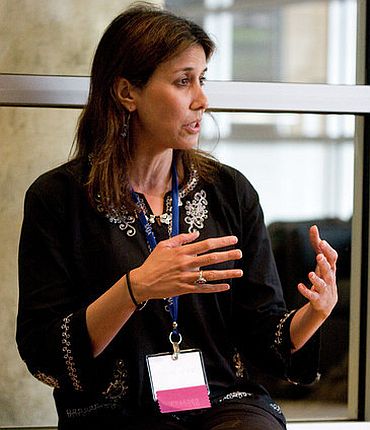
In perhaps the most interesting session of the day, journalists Rahul Pandita, Samanth Subramanian and Geeta Anand spoke about tackling narrative non-fiction.
Pandita has written Hello Bastar, an account of his travels to Maoist-affected areas over 12 years, Subramanian's book Following Fish has been hailed as one of the greatest works of narrative non-fiction coming out of India last year, while Geeta Anand is a Pulitzer prize-winning journalist of the Wall Street Journal and author of the book The Cure that has been adapted into a movie starring Harrison Ford and Brendan Fraser.
The three journalists spoke about the challenges of writing narrative journalistic pieces and non-fiction books.
Pandita rued about the lack of magazines like the New Yorker in India that would be willing to invest time, faith and money in reporters who could work on one single story for months on end.
Anand spoke about how her relationship with the Crowleys developed over a period of five years when she was working with them on the book.
Samanth who is currently working on a book on the civil war in Sri Lanka talked at length about how he worked towards avoid getting stereotyped as a travel writer.
For the serious subjects that the writers dealt with, the session itself was quite enjoyable as Pandita recalled (for the 50th time he said) an incident when while trying to sneak into Iran from Jordan the Republican Guard caught him and put a gun to his chest and let him go as he began singing an Iraqi song he'd learnt.
...
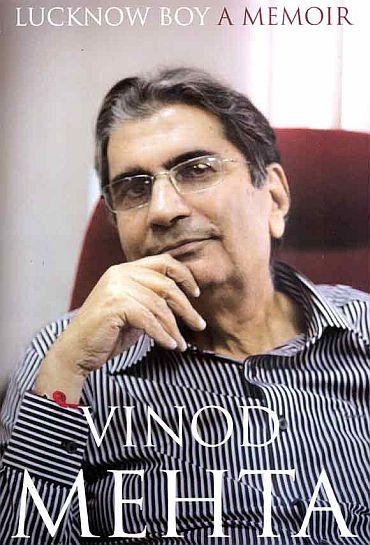
If Chetan Bhagat was the star of Day One, Vinod Mehta found himself to be in the limelight on Day Three.
The editor-in-chief of Outlook magazine who's recently published his memoir Lucknow Boy found himself looking at a really long queue of his fans wanting his autograph.
At a session earlier, Mehta talked about the relationship between journalists and politicians and publishing the Radia tapes, which he said was one of the toughest professional decisions he's had to make.
The veteran journalist said that every political source must understand that being close to a journalist doesn't give them immunity of any sort. He also pointed out that some journalists do tend to let power go to their heads by simply hanging out with powerful people.
Both politicians and journalists need each other, he said but added that they must both understand that they are adversaries -- a politician's job is to hide information, while a journalist's is to seek it.
The Radia tapes, he said, did cost the magazine as advertisements stopped and NDTV (though informally) had banned him from appearing on their channels.
Without taking any names, he also suggested that when people make mistakes they must admit to it gracefully rather than trying to justify what they did.
He recollected an incident when Barkha Dutt met him at a party and told him how upset she was about the tapes when at the same time another gentleman walked up to him congratulating him for publishing them.
When the audience prodded on, Mehta requested not to talk any more. "I am in enough trouble with her already," he said.
That of course didn't stop people from queuing up outside the venue for his autograph -- a file that was longer than the one waiting for Chetan Bhagat.
...

On a lighter note, Allan Pease the famous author of Why Men Don't Listen and Women Can't Read Maps had the audience in splits as he talked about the essential difference between men and women.
Watch this video of him!
...

In one of the last sessions of the festival, S Hussain Zaidi, Jai Arjun Singh and Sooni Taraporevala spoke about the challenges of adapting a book into a movie.
While this session wasn't very interesting, the one happening next door saw some of the best names including Chiki Sarkar and Mohsin Hamid among others talking about south Asian literary scene.
The session was so crowded that William Dalrymple had to sit on the floor.
Some of the things that were discussed included the need to stay in the country about which you write -- Vikram Chandra for instance lives in California even as he writes about India unlike Mohsin Hamid who lives in and writes about Pakistan.
Authors spoke about dealing with procrastination and the process of writing a book.
Mohsin Hamid made an interesting point where he said if it was possible to distil the essence of a novel down to its subject, 'it would be just a sentence'.
The three-day festival came to a close, with a performance by Paradigm Shift, a New Delhi-based Indie rock band.